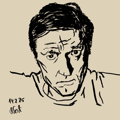Beta Block : Bookwyrm reviewed Der Trafikant by Robert Seethaler
Österreich in der Nazizeit
4 stars
Das Buch spielt in den Jahren 1937/1938 in Wien. Protagonist ist ein 17jähriger Junge vom Dorf, der in die Großstadt geschickt wird, um in einem Tabakladen zu arbeiten. Schnell stellt sich heraus, dass er alles andere als dumm ist. Er macht sich tiefgehende Gedanken zu allen möglichen Themen, verliebt sich und freundet sich mit Sigmund Freud an. Dann jedoch gewinnen die Nazis immer mehr an Macht, der Anschluss Österreichs ans Deutsche Reich findet statt und alles ändert sich.
Ich fand interessant, die Nazizeit einmal aus österreichischer Perspektive betrachtet zu sehen, denn bisher hatte ich mich mit dem Land noch gar nicht so beschäftigt.
Das Buch spielt in den Jahren 1937/1938 in Wien. Protagonist ist ein 17jähriger Junge vom Dorf, der in die Großstadt geschickt wird, um in einem Tabakladen zu arbeiten. Schnell stellt sich heraus, dass er alles andere als dumm ist. Er macht sich tiefgehende Gedanken zu allen möglichen Themen, verliebt sich und freundet sich mit Sigmund Freud an. Dann jedoch gewinnen die Nazis immer mehr an Macht, der Anschluss Österreichs ans Deutsche Reich findet statt und alles ändert sich.
Ich fand interessant, die Nazizeit einmal aus österreichischer Perspektive betrachtet zu sehen, denn bisher hatte ich mich mit dem Land noch gar nicht so beschäftigt.



